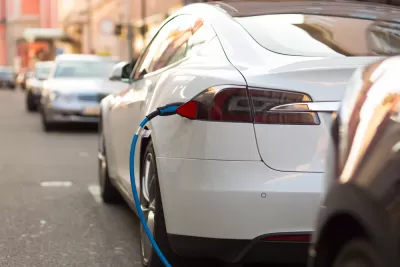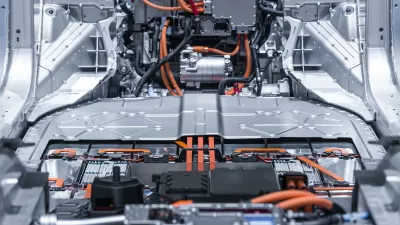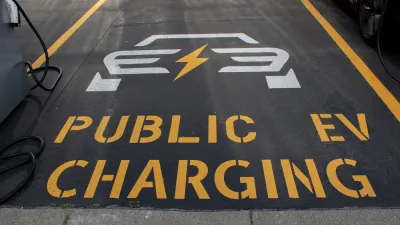The electric car is poised to have its moment. In fact, the 2020s could be the decade of the electric car.

Tom Randall reports: "Battery prices fell 35 percent last year and are on a trajectory to make unsubsidized electric vehicles as affordable as their gasoline counterparts in the next six years, according to a new analysis of the electric-vehicle market by Bloomberg New Energy Finance (BNEF)."
The same report expects for long-range electric vehicles to cost $22,000 (in today's dollars) by the year 2040. Randall notes that OPEC is maintaining that the adoption of electric car technology will occur slowly, making up just 1 percent of car sales by 2040. But many indications say otherwise. Sales of electric cars are now growing 60 percent year over year worldwide, for instance—the same rate that pushed henry Ford's Model T past the horse and buggy back in the 1910s, according to Randall.
After noting the growth rate of electric vehicle sales, Randall changes focus to the impact the electric car market will have on the oil industry. "[Bloomberg analysis] found that electric vehicles could displace oil demand of 2 million barrels a day as early as 2023. That would create a glut of oil equivalent to what triggered the 2014 oil crisis." At that point, the story becomes equally about the rise of the electric car as it becomes about the next great oil crash.
David Roberts picked up on the report for Vox by explaining the S curve of technology adoption and rehashing Randall's points.
FULL STORY: Here’s How Electric Cars Will Cause the Next Oil Crisis

Alabama: Trump Terminates Settlements for Black Communities Harmed By Raw Sewage
Trump deemed the landmark civil rights agreement “illegal DEI and environmental justice policy.”

Planetizen Federal Action Tracker
A weekly monitor of how Trump’s orders and actions are impacting planners and planning in America.

The 120 Year Old Tiny Home Villages That Sheltered San Francisco’s Earthquake Refugees
More than a century ago, San Francisco mobilized to house thousands of residents displaced by the 1906 earthquake. Could their strategy offer a model for the present?

San Francisco Opens Park on Former Great Highway
The Sunset Dunes park’s grand opening attracted both fans and detractors.

Oregon Legislature to Consider Transit Funding Laws
One proposal would increase the state’s payroll tax by .08% to fund transit agencies and expand service.

Housing Vouchers as a Key Piece of Houston’s Housing Strategy
The Houston Housing Authority supports 19,000 households through the housing voucher program.
Urban Design for Planners 1: Software Tools
This six-course series explores essential urban design concepts using open source software and equips planners with the tools they need to participate fully in the urban design process.
Planning for Universal Design
Learn the tools for implementing Universal Design in planning regulations.
Clanton & Associates, Inc.
Jessamine County Fiscal Court
Institute for Housing and Urban Development Studies (IHS)
City of Grandview
Harvard GSD Executive Education
Toledo-Lucas County Plan Commissions
Salt Lake City
NYU Wagner Graduate School of Public Service





























